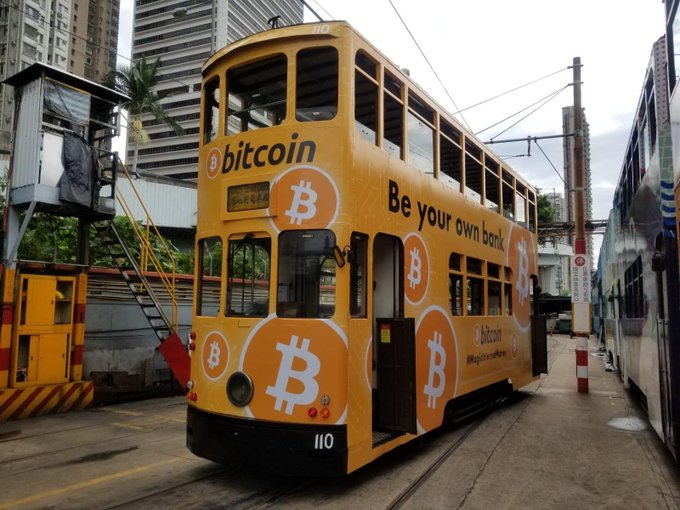23 May, 2021

An advertisement for Bitcoin on a tram in Hong Kong. Photo / AP
Daily Telegraph UK
By: James Titcomb
OPINION:
Bill Clinton once quipped that China attempting to censor the internet would be like "trying to nail jello to the wall". Cyberspace, he said in 2000, existed outside of any jurisdiction. Freedom would come to China down the copper wire, whether Beijing liked it or not.
Today, Clinton's prediction sits in a long list of hopelessly optimistic forecasts about the web before most of its downsides were apparent.
Beijing did indeed nail jelly to the wall. Today, the Chinese internet is locked down, with sites that do not obey the Communist Party's strict censorship rules blocked to most internet users. Websites may exist outside of any one government's control, but people's access to them is a different matter.
Today, China's success in restricting the internet influences many other governments which are concerned about technologies that threaten to moderate their influence.
Brazil has at times ordered telecoms companies to block WhatsApp over its use of uncrackable end-to-end encryption. Last year, Turkey blocked several social networks after airstrikes in northern Syria. Widespread internet blackouts have become more common in recent years, often around elections and moments of political tension.
Most authorities are not nearly as effective as China, which has devoted huge resources to a multi-decade effort to shape the internet. But this has not stopped them trying - the web does not exist entirely independently.
What the internet was supposed to do for information, Bitcoin is now meant to do for money. The cryptocurrency's more zealous supporters (as opposed to the masses merely speculating on its price) argue that Bitcoin is free from government control, decentralised, and governed by the laws of mathematics and logic rather than the whims of central bankers or corrupt dictators.
On a fundamental level, they are correct. The blockchain network that maintains Bitcoin runs on thousands of computers around the world, a mesh of individual nodes with no one point that could fail. The number of virtual coins that can be created, as well as the rules around how they are made, is effectively set in stone. Absent an unlikely set of events in which one entity takes over half of the network, this will not change.
And despite the huge potential rewards from doing so (the total value of all Bitcoins in circulation is almost US$700 billion, about NZ$975b), nobody has come close to hacking the network.
/cloudfront-ap-southeast-2.images.arcpublishing.com/nzme/ZAGD2NW2LPHK6I2GSD2BPSNYU4.jpg)
President Xi Jinping at the Chinese People's Political Consultative Conference in May 2020. Both China and the US have shown they can knock Bitcoin's price with statements alone. Photo / AP
All this is what gives the cryptocurrency's backers confidence that Bitcoin represents a digital (and thus better) form of gold, a secure and dependable asset independent of the whims of world leaders.
But last week, even the cryptocurrency's staunchest backers may have felt a twinge of uncertainty about exactly how independent the technology is. Bitcoin fell by as much as 30 per cent on Wednesday, with other virtual currencies also dropping, after China's central bank told financial institutions not to deal in cryptocurrencies or take them as a form of payment.
All this is what gives the cryptocurrency's backers confidence that Bitcoin represents a digital (and thus better) form of gold, a secure and dependable asset independent of the whims of world leaders.
But last week, even the cryptocurrency's staunchest backers may have felt a twinge of uncertainty about exactly how independent the technology is. Bitcoin fell by as much as 30 per cent on Wednesday, with other virtual currencies also dropping, after China's central bank told financial institutions not to deal in cryptocurrencies or take them as a form of payment.
After a slight recovery, digital coins dipped again the following day when the United States government demanded that cryptocurrency transactions worth more than US$10,000 be reported to combat concerns they are being used to avoid taxes.
Prices dropped further again on Friday, when Chinese authorities doubled down by promising to take action against "mining", the energy-intensive process by which new coins are created and transactions processed. Prices have now fallen more than 40 per cent in slightly over a month, from above US$63,000 in mid-April to as low as US$34,000 on Friday.
While the Bitcoin network remains as secure and resistant to government intervention as it was a week ago, the same cannot be said for its value. Both China and the US demonstrated an ability to knock Bitcoin's price with strongly worded statements alone. Actual action could take a far greater toll.
There are a host of other methods which governments could use to interfere in the ways Bitcoin interacts with the regulated financial system, from shutting down or restricting the exchanges where cryptocurrencies are bought, to taxing their sales, making ownership illegal or shutting down miners.
Companies and institutional investors - whose interest has been seen as partly responsible for the rise in Bitcoin's price over the past few months - could be pressured to step back.
None of this would technically stop people owning Bitcoin, but it could, in theory, make the currency much more difficult to use - or perhaps just as relevant, cause prices to swing to the extent that few will trust it as a store of value.
It should be said that this has been tried before. Many countries have attempted to shut down or limit use of cryptocurrencies without success. Indeed, such efforts may only serve to increase the supposed value of systems outside their control.
But if, as Bitcoin's champions argue, we are only at the start of the cryptocurrency's journey, we may also be in the early stages of governments attempting to limit it. Bitcoin may be where the Chinese internet was in 2000.
Governments may start to take a stronger line - perhaps due to growing concerns about its use in ransomware cyberattacks, or if they really do fear national currencies declining in importance in comparison.
Bitcoin's backers will say "bring it on", that each test the digital currency passes will make it stronger. They are likely to get what they wish for.







No comments:
Post a Comment